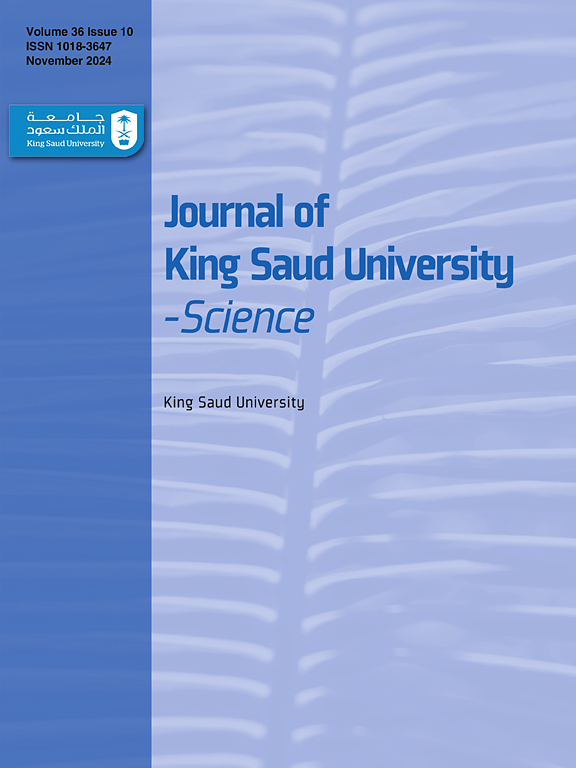Pharmacological assessment of delphinidin in counteracting polystyrene microplastic induced renal dysfunction in rats
IF 3.7
3区 综合性期刊
Q1 MULTIDISCIPLINARY SCIENCES
引用次数: 0
Abstract
Polystyrene microplastics (PSMP) are toxic environmental contaminants which can damage various body organs including kidneys. Delphinidin (DEL) is a potential anthocyanidin flavonoid with significant pharmacological benefits. This research was conducted to analyze the protective effect of DEL to avert PSMP prompted renal dysfunction. Rats (n = 24) were divided into 4 separate groups: Control, PSMP (0.01 mgkg−1), PSMP (0.01 mgkg−1) + DEL (25 mgkg−1) and only DEL (25 mgkg−1). Our results showed that PSMP exposure reduced the expressions of Nrf-2 and antioxidant genes while increasing the expression of Keap1. Besides, PSMP intoxication escalated the level of kidney injury markers (urea, KIM-1, creatinine and NGAL) while inducing substantial reduction in the levels of creatinine clearance. Moreover, PSMP significantly reduced the levels of GSH, GST, SOD, HO-1, CAT, GSR, GPx while escalating MDA and ROS. Conversely, inflammatory biomarkers including IL-1β, TNF-α, NF-kB, IL-6 and COX-2 activity were increased due to PSMP intoxication. Our results showed that PSMP administration increased the expressions of Bax and caspase-3 while decreasing the expression of Bcl-2. However, DEL treatment significantly restored the PSMP-induced renal impairments. Therefore, it is suggested that DEL could be used as a therapeutic compound to alleviate PSMP-induced kidney damage in rats, possibly due to its strong pharmacological properties.
德尔菲尼丁对抗聚苯乙烯微塑料诱发的大鼠肾功能障碍的药理评估
聚苯乙烯微塑料(PSMP)是一种有毒的环境污染物,会损害包括肾脏在内的多个人体器官。Delphinidin(DEL)是一种潜在的花青素类黄酮,具有显著的药理作用。本研究旨在分析 DEL 对避免 PSMP 引起的肾功能障碍的保护作用。大鼠(n = 24)被分为 4 组:对照组、PSMP(0.01 毫克/公斤-1)组、PSMP(0.01 毫克/公斤-1)+ DEL(25 毫克/公斤-1)组和仅 DEL(25 毫克/公斤-1)组。结果表明,PSMP 暴露降低了 Nrf-2 和抗氧化基因的表达,同时增加了 Keap1 的表达。此外,PSMP 中毒会使肾损伤标志物(尿素、KIM-1、肌酐和 NGAL)水平升高,同时导致肌酐清除率水平大幅下降。此外,PSMP 还大大降低了 GSH、GST、SOD、HO-1、CAT、GSR 和 GPx 的水平,同时增加了 MDA 和 ROS。相反,PSMP 中毒导致炎症生物标志物(包括 IL-1β、TNF-α、NF-kB、IL-6 和 COX-2 活性)增加。我们的研究结果表明,PSMP 会增加 Bax 和 caspase-3 的表达,同时降低 Bcl-2 的表达。然而,DEL 治疗可明显恢复 PSMP 引起的肾功能损伤。因此,我们认为 DEL 可作为一种治疗化合物来减轻 PSMP 诱导的大鼠肾损伤,这可能是由于它具有很强的药理特性。
本文章由计算机程序翻译,如有差异,请以英文原文为准。
求助全文
约1分钟内获得全文
求助全文
来源期刊

Journal of King Saud University - Science
Multidisciplinary-Multidisciplinary
CiteScore
7.20
自引率
2.60%
发文量
642
审稿时长
49 days
期刊介绍:
Journal of King Saud University – Science is an official refereed publication of King Saud University and the publishing services is provided by Elsevier. It publishes peer-reviewed research articles in the fields of physics, astronomy, mathematics, statistics, chemistry, biochemistry, earth sciences, life and environmental sciences on the basis of scientific originality and interdisciplinary interest. It is devoted primarily to research papers but short communications, reviews and book reviews are also included. The editorial board and associated editors, composed of prominent scientists from around the world, are representative of the disciplines covered by the journal.
 求助内容:
求助内容: 应助结果提醒方式:
应助结果提醒方式:


